Archaeology, Heritage, and Civic Engagement by Little Barbara J; Shackel Paul A; & Paul A. Shackel

Author:Little, Barbara J; Shackel, Paul A; & Paul A. Shackel
Language: eng
Format: epub
Publisher: Taylor and Francis
Published: 2016-04-15T04:00:00+00:00
Chapter 8
The (Re)Evolving Mission of Higher Education
What Is the Role of the University?
In a 2009 essay in the New York Times, Harvard University president Drew Gilpin Faust states that the American university is undergoing a crisis of purpose, as universities will increasingly be called upon to help solve many of the social problems facing our nation. While many Americans may have the notion that university education should serve the market, this market model conflicts with the idea that “universities are meant to be producers not just of knowledge but also of (often inconvenient) doubt” (Faust 2009). Faust recognizes that people need jobs; however, they also seek meaning, understanding, and perspective. She writes, “The question should not be whether we can afford to believe in such purposes in these times, but whether we can afford not to.” Doubt, as it supports the ability to question our own individual ideas, beliefs and values, as well as those of our society, is an essential ingredient for transformational learning.
For several decades, critics of American higher education have recognized the crisis of purpose that Faust describes. Colleges and universities have been called upon to renew their historic commitment to service. Government and business leaders as well as social policy experts are asking universities to assume a greater role in addressing society’s increasing problems and meeting growing human needs. New, developing programs in higher education are focusing on building and sustaining relationships with neighbors and communities. The Association of American Colleges and Universities (2010) suggests that recent educational innovations that advance civic engagement, such as thematically linked learning communities, community-based research, collaborative projects, service learning, mentored internships, reflective experiential learning, and study abroad, are all helping students advance toward this essential learning goal. While there is a call for colleges and universities to be active in local and national communities, the experiences of each institution vary considerably.
The turn of the twenty-first century has some issues in common with those at the turn of the twentieth century. At that time, social capital was at a low point. A century ago, urban decay, unchecked industrialization, and massive immigration strained society. In the late 1880s, in response to these social problems, Smith College became involved in social welfare programs in New York City to help the urban poor. The college settlement movement grew and other colleges throughout the country became engaged in their local communities to address social problems. At the turn of the century, Americans believed that universities could lead the way in social reform (Berube and Berube 2010, 4-5).
By the end of World War II and through the Cold War era, the American university in general lost its mission of serving communities. Rather, attention turned toward the needs of outside interests that provided financial support. Significant research funding came from the military-industrial complex, and by the 1970s, an increasing amount of research in universities was sponsored by private industries. Jennifer Washburn (quoted in Berube and Berube 2010, 52–53) wrote in 1980 that, “the single greatest threat to
Download
This site does not store any files on its server. We only index and link to content provided by other sites. Please contact the content providers to delete copyright contents if any and email us, we'll remove relevant links or contents immediately.
| Anthropology | Archaeology |
| Philosophy | Politics & Government |
| Social Sciences | Sociology |
| Women's Studies |
Mysteries by Colin Wilson(3248)
People of the Earth: An Introduction to World Prehistory by Dr. Brian Fagan & Nadia Durrani(2619)
Ancient Worlds by Michael Scott(2492)
Foreign Devils on the Silk Road: The Search for the Lost Treasures of Central Asia by Peter Hopkirk(2385)
The Memory Code by Lynne Kelly(2272)
The Splendid and the Vile by Erik Larson(2225)
Lost Technologies of Ancient Egypt by Christopher Dunn(2109)
The Earth Chronicles Handbook by Zecharia Sitchin(2100)
Come, Tell Me How You Live by Mallowan Agatha Christie(2025)
The Plantagenets by Dan Jones(1931)
Last Chance to See by Douglas Adams(1848)
The Return of the Gods by Erich von Daniken(1839)
Wars of the Anunnaki by Chris H. Hardy(1631)
Keeper of Genesis by Graham Hancock(1540)
Before the Dawn by Nicholas Wade(1529)
The Cygnus Mystery by Andrew Collins(1468)
The Message of the Sphinx by Graham Hancock(1433)
Fragile Lives by Stephen Westaby(1363)
Hieroglyphs: A Very Short Introduction by Penelope Wilson(1271)
